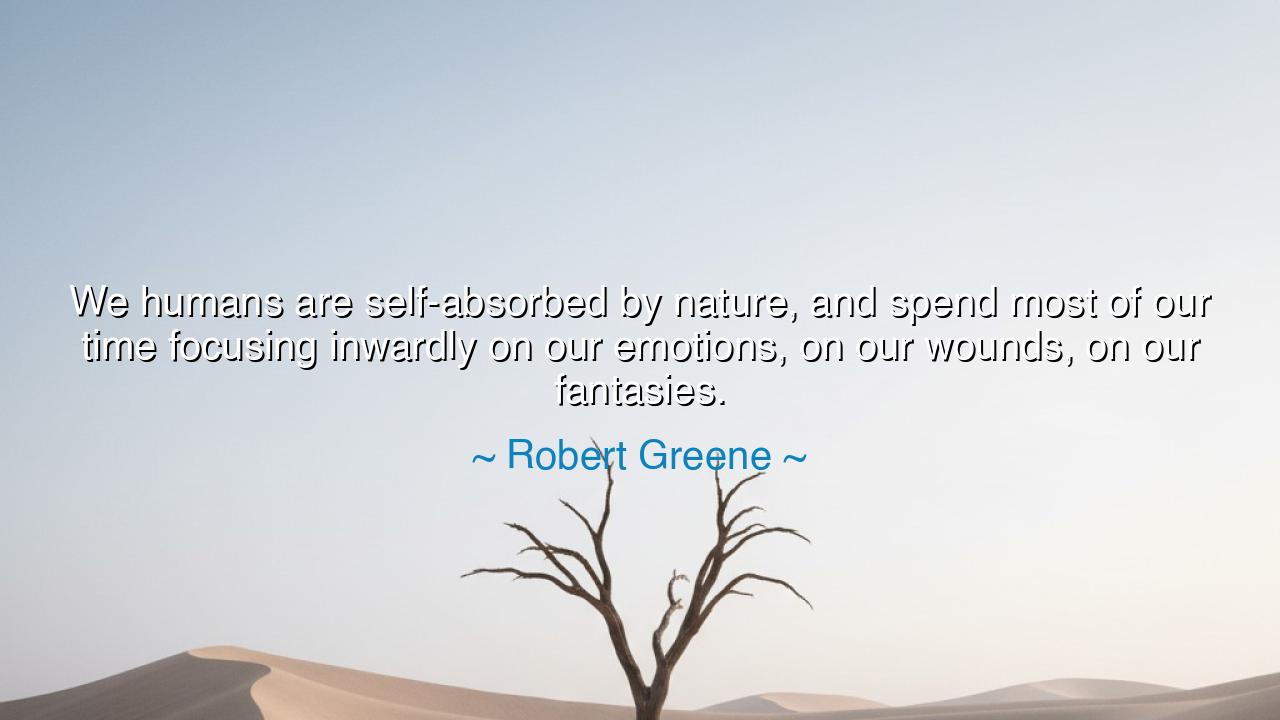
We humans are self-absorbed by nature, and spend most of our
We humans are self-absorbed by nature, and spend most of our time focusing inwardly on our emotions, on our wounds, on our fantasies.






The words of Robert Greene—“We humans are self-absorbed by nature, and spend most of our time focusing inwardly on our emotions, on our wounds, on our fantasies”—speak with the solemn clarity of a sage observing the eternal tendencies of mankind. He reveals that our nature inclines us toward introspection, often to excess. We dwell upon our emotions, nursing our joys and sorrows, tending to the deep wounds of the heart, and crafting elaborate fantasies of what might be. In this inward turn, we become captivated by ourselves, sometimes blind to the broader currents of life flowing around us.
The meaning of this teaching is both cautionary and illuminating. Greene reminds us that self-absorption is a natural human condition, but one that carries risks. When we dwell solely within the chambers of our own mind, we may exaggerate grief, inflate desire, or become enslaved to imagined narratives. Yet self-awareness, when tempered with observation of the world beyond ourselves, can be a source of wisdom. The key lies not in denying our inner life, but in balancing it with attention to the outer world, to action, and to the truths of others.
History offers many examples of this inward preoccupation. Consider King Lear of old, whose self-absorption and fixation upon his own perceived wounds led him to misjudge his children, to misread loyalty and deceit, and ultimately to tragedy. By turning his gaze too inward, he neglected the realities around him and suffered a profound downfall. Greene’s words echo in Lear’s lament: unchecked self-focus can blind the soul, creating illusions where clarity should reign.
In contrast, there are those who have learned to navigate the tension between self-reflection and engagement with the world. Marcus Aurelius, the Stoic emperor, regularly examined his own mind, emotions, and motives, yet he paired this with service to the empire and attention to justice. He understood that to be human is to be inwardly aware, but that the inward gaze must inform, not dominate, one’s engagement with life. The emperor exemplifies Greene’s lesson: self-absorption can become a tool for mastery rather than a trap.
The lesson for us, O seekers of wisdom, is that we must confront the natural pull of our own self-absorption. To dwell excessively on wounds, desires, or fantasies is to become prisoners of our own making. Yet by observing our inner life without attachment, we can transform reflection into insight, understanding both ourselves and the world more clearly. Self-awareness should be the lantern that illuminates our actions, not the mirror that isolates us.
Practically, this means cultivating daily practices of balanced reflection. Take time to examine emotions and fantasies, but pair this with outward observation. Engage with people, witness events, and allow the realities of life to temper the narratives spun within your mind. Journaling, meditation, and purposeful dialogue can anchor introspection while preventing it from spiraling into narcissism or obsession. In doing so, self-focus becomes a tool for growth rather than a trap.
Thus let it be inscribed upon the hearts of those who seek mastery over life: we are indeed self-absorbed by nature, but this is not a curse—if approached wisely, it is a gateway. The inward gaze, directed with discipline, can illuminate our character, reveal our desires, and guide us through the labyrinth of human experience. To dwell within, and yet not be lost, is to walk the path of understanding, balancing the inner life with the infinite currents of the world around us.






AAdministratorAdministrator
Welcome, honored guests. Please leave a comment, we will respond soon